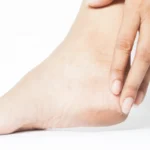Relief from foot pain is important after you’ve been on your feet too long. The pain can hit your heel, arch, or toes, and often shows that there’s an underlying injury or health issue. Your feet take a real beating when you stand or walk for hours.
Why Your Feet Hurt After Walking Too Much
Your feet absorb huge forces with each step. A single stride puts pressure of 2-3 times your body weight on your feet. Most people take between 3,000-5,000 steps daily, and active people might reach 10,000 steps. This makes foot pain from too much walking pretty common.

Common causes of sore feet from walking
One in four adults experience foot pain, which ranks as a top cause of limited mobility, especially in older people. Your foot’s biomechanics are a big part of foot health. Pain often develops when these biomechanics don’t work right. A few conditions often cause sore feet from walking.
Plantar Fasciitis
Inflammation of the thick band of tissue connecting your heel to your toes that causes stabbing heel pain.
Metatarsalgia
Painful inflammation in the ball of your foot creates sharp aching and burning sensations.
Morton's Neuroma
Thickened nerve tissue between your toes (usually third and fourth) makes you feel like you’re walking on a pebble.
Stress Fractures
Tiny cracks in foot bones from repeated force that develop slowly and get worse with activity.
How overuse creates inflammation and strain
Your foot follows a complex motion sequence during normal walking. Too much walking without rest disrupts this natural process and creates bad movement patterns. People with foot pain develop different walking styles to reduce discomfort. Those with heel pain show less pressure under the painful area compared to people without pain. Your body tries to move weight away from sore spots. Repeated small injuries from overuse build up tissue damage over time.
When foot pain becomes a medical concern
Brief discomfort after long walks is normal, but watch for symptoms.
- Pain lasting more than 2 weeks without getting better
- Sudden or severe foot pain that prevents you from bearing weight
- Swelling, redness, or warmth in the affected area
- Pain that gets worse or stops normal walking
- Numbness or tingling in your foot’s bottom
Preventing Future Foot Pain from Overuse
Taking care of your feet before problems come up works better than treating them after damage. You can keep your feet healthy with some smart strategies, even when you’re more active than usual.

Choose the right shoes for your activity
Each activity needs specific types of footwear. People who walk or stand all day should look for shoes with firm arch support, a roomy toe box, and structured heel support. Strength training works best with more stable shoes. Anyone who walks trails needs durable uppers with deeper tread patterns to handle rough ground. The key step is getting your feet measured by a professional at least every two years because your foot size changes as you age.
Replace worn-out footwear regularly
The best shoes eventually lose their support. Most walking shoes last about 300-500 miles before they need replacement. Someone who walks 30 minutes daily should replace their shoes every six months. Daily hour-long walks mean new shoes every three months. You’ll know it’s time for new shoes when you see worn treads, wrinkles in the sole, uneven heel wear, or less cushioning. Your shoes will last longer if you switch between multiple pairs.
Maintain a healthy weight to reduce pressure
Self-care helps with minor foot discomfort, but some warning signs tell you it’s time to see a podiatrist. Early recognition of these signals prevents complications and chronic pain conditions.
When to See a Podiatrist for Foot Pain
Self-care helps with minor foot discomfort, but some warning signs tell you it’s time to see a podiatrist. Early recognition of these signals prevents complications and chronic pain conditions.

Signs your foot pain needs medical attention
Schedule an appointment with a podiatrist if any of these symptoms are affecting you.
- Your foot pain lasts longer than two weeks without improvement
- You feel sudden or severe foot pain
- Pain starts after an injury
- Pain gets worse instead of better
- Swelling doesn’t improve within 2–5 days
- You experience tingling, numbness, or burning pain in the bottom of your foot
How Victoria Foot & Ankle Center can help
Dr. Eberly and the team at Victoria Foot & Ankle Center provide complete foot and ankle care for patients of all ages. Dr. Eberly brings clinical experience as a board-certified podiatrist and podiatric surgeon who specializes in both surgical and non-surgical treatments.
The practice offers X-rays to check for bone and joint injuries, plus advanced imaging tests like CT scans, MRIs, and ultrasounds when needed. Patients receive specific treatment options from custom orthotics and cortisone injections to physical therapy and surgery for serious conditions.
Do You Need A Podiatrist?
Foot pain from too much walking can make your life a little bit tougher. This piece explores common causes of foot discomfort, relief strategies, and ways to keep your feet healthy. Learning about what causes your pain is the first step to finding the right treatment. Dr. Eberly and his team at Victoria Foot & Ankle Center specialize in treatments for all foot and ankle conditions. Call Victoria Foot & Ankle Center today and take your first step toward pain-free walking.
Foot Pain FAQs
How can I relieve foot pain after walking all day?
To alleviate foot pain after extensive walking, try resting and elevating your feet, applying ice to reduce swelling, and using over-the-counter pain relief creams.
What are some effective treatments for overused feet?
To treat overused feet, focus on rest and reducing inflammation. Apply cold therapy, elevate your feet, and consider using Epsom salt soaks. It’s also important to wear proper footwear.
Why do my feet hurt when I walk too much?
Excessive walking can lead to foot pain due to overuse which causes inflammation and strain on the feet’s structures. Common conditions that result from too much walking include plantar fasciitis, metatarsalgia, and stress fractures.
Is it okay to continue walking when my feet are in pain?
It’s generally not advisable to continue walking when experiencing foot pain. Doing so can worsen the condition and lead to chronic issues. Instead, rest your feet, apply appropriate treatments, and consult a podiatrist if the pain persists for more than two weeks or is severe.
How can I prevent foot pain from walking in the future?
To prevent future foot pain from walking, choose appropriate footwear for your activities, replace worn-out shoes regularly, and incorporate foot-strengthening exercises into your routine.








